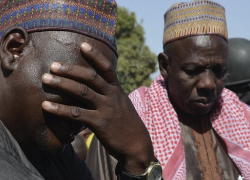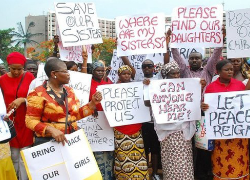With the abduction of more than 200 schoolgirls last month, the bombing in a bus station on April 14 that killed 71 and injured 124, and a car bombing on May 1st, the international community is waking up to the horrors of Boko Haram.
A militant Islamist group, Boko Haram was initially founded as a religious organization by radical Muslim cleric Mohhammed Yusuf in 2002. Yusuf set up a complex and school in the northeast city of Maiduguri under the premise that all western education was corrupt and sinful. In fact, Boko Haram, loosely translated from the local Hausa language means “western education is forbidden.” The complex quickly became a recruiting ground for jihadist militants and Boko Haram carried out a series of attacks on government offices and police in Maiduguri. Following a shoot-out with police in 2009, Nigerian security forces reported the death of Yusuf and declared that the group had been disbanded.
The group did not disband, and in 2010, current Boko Haram leader Abubakar Shekau released a 25-minute video clip denouncing western civilization and pledging to continue militant attacks. Since then, the group has staged numerous assaults including a bombing of police and UN headquarters in Nigeria. The group has continued to reject any notions of opening a dialog with the Nigerian government. Boko Haram was labeled a Foreign Terrorist Organization (FTO) by the U.S. State Department in November of 2013, and following the group’s public statement vowing to attack the U.S. and Europe last year, the U.S. issued a $7 million bounty for the capture of Shekau.

On April 14 over 100 armed Boko Haram militants stormed an all-girl boarding school in Chibok in the remote north-eastern state of Borno and kidnapped over 200 young girls age 16 to 18. The girls had been called in to sit for their final physics exam when all other schools in the area had been closed due to security concerns. While two groups of girls escaped, recent reports indicate that the remaining kidnapped girls have been taken into Boko Haram strongholds in the Sambisa forest and sold as brides to the militants. Shekau first threatened to capture young women and girls as slaves and brides in video released in May 2013 and it is believed that the group intends to adhere to ancient Islam beliefs that state women and girls captured during war are slaves with whom their “masters’ can have sex with at will. Parents of the kidnapped girls have organized searches into the area, and last week several hundred protesters braved heavy rain to assemble in Abuja, and deliver a letter to the National Assembly complaining that the government was not doing enough to search for the girls. “All we want from the government is to help us bring our children back,” said one parent last week.
Other schools are also in an abysmal situation. At least three professors have been killed at the University of Maiduguri, students have withdrawn and teachers have relocated out of fear and threats of continued violence.
With recent announcement that Nigeria had surpassed South Africa as the leading economy in sub-Saharan Africa, and with the World Economic Forum on Africa set to take place in Abuja on May 9th, the government and President Goodluck Jonathan are struggling to quell concerns over recent violence. While security has been stepped up amid fears that Boko Haram is moving its focus closer to the capital, many are reporting that it appears that the group intends to align itself with similar extremist assemblies in Niger, Mali, and the Middle East. Scholars and members of the international legal and political community are calling for assistance to be given to the Nigerian government.
Former British prime minister and current UN advisor Gordon Brown has called for international military assistance to be offered to the Nigerian government in a hunt for the missing girls. “The International community must do something to protect these girls,” Brown said in an interview last week. “We could provide military help to the Nigerians to track down the whereabouts of the girls before they’re dispersed throughout Africa.” A government advisor to the President said that the government welcomes international assistance in the matter.

Large-scale pledges are not bringing home the missing 200 girls, and the guerrilla nature of the insurgency requires specialized local measures. “We know where these girls are being held in the forest,” one local Nigerian soldier reported, “[but] somebody high up in the chain of command is leaking up information to these people.” Although officials have long ruled out foreign intervention, many are calling for improved tactics. A representative of the government said that “if countries can help us by way of arming our people through modern surveillance equipment, for defence and all that, it will be most welcome. [But] what Boko Haram is doing is not a formal kind of fight, but a guerrilla kind of fight, and it is only the local people that will tell you how to fight it.”
It seems then, that a two-fold approach must be taken, one where large-scale international assistance is given to the Nigerian government to combat overall strikes of violence and immediate and targeted assistance is given to troops in Chibok in order to bring home the abducted girls as quickly as possible. Whether it be through international intervention, or the systematic arming of local governments, without assistance, the outwardly booming Nigerian government seems to be powerless to quell the continued threat of violence from Boko Haram.
Bree Plasters is a rising 3L at the University of Denver Sturm College of Law and is the Executive Editor-Elect for the 2014-2015 Denver Journal of International Law & Policy.

